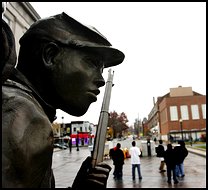The Day of Jubilee is Come, sure!

Below is an account of Lincoln's visit to a battlefield.
Lincoln never missed an occasion to thank the troops and General Grant at the time where almost everyone universally disapproved of Grant and the army's performance.
Notice also how the troops cheered Lincoln. Lincoln knew and stated on numerous occasions that it was the soldiers and generals who fought the war. His bind with the fighting men was powerful and misunderstood by many civilians and critics. The men who were risking thier lives had an unwavering faith in Lincoln's loyalty and many attempts by the Northern media to cut that 'mystic cord' between the President and his army failed miserably.
Also notice how the black troops cheered Lincoln and saw in him their liberator.
The African-Americans who fought and died for their freedom loved Lincoln. Many African-Americans today who live in freedom do not. The indoctrinated population today thinks of Lincoln as a political opportunist who used African-Americans and the issue of slavery to his ends. Ask yourself why? What happended to that powerful bond of gratitude that won the war?
Think about it but also remember. There is no real freedom without gratitude, there is no real freedom without accepting the sacrifices of others, whether that other is the President of the United States, a Union slodier at Gettysburg or a US Marine in Baghdad.
LINCOLN'S UNEXPECTED VISIT TO A BATTLEFIELD
As Grant and Sherman grappled with the enemy, Lincoln did what he could to sustain the army and to boost civilian morale. On every possible occasion —even on such an unlikely one as the resumption of White House concerts by the Marine Hand—he asked his listeners to give three cheers for "Grant and all the armies under his command." Again and again, he expressed gratitude to the soldiers, to the officers, and especially to "that brave and loyal man," the "modest General at the head of our armies." After his renomination, when the Ohio delegation serenaded him with a brass band, he responded: "What we want, still more than Baltimore conventions or presidential elections, is success under Gen. Grant," and he urged his hearers to bend all their energies to support "the brave officers and soldiers in the field."
He continued to have great faith in Grant, but he was conscious of the swelling chorus of criticism of the general. Many doubted Grant's strategic ability and pointed out that in shifting his base to the James River he was simply repeating what McClellan had done—with far fewer casualties. "Why did he not take his army south of the James at once, and thus save seventy-five thousand men?" asked Senator Grimes, who pronounced Grant's campaign a failure. Even in the President's own household there was distrust of the general. "He is a butcher," Mary Lincoln often said, "and is not fit to he at the head of an army."
The outcry against Grant made the President want to see for himself what was happening with the Army of the Potomac, and on June 20, accompanied by Tad, he made an unheralded visit to Grant's headquarters at City Point. Looking, as Horace Porter, one of Grant's aides, wrote, "very much like a boss undertaker" in his black suit, the President announced as he landed: "I just thought I would jump aboard a boat and come down and see you. I don't expect I can do any good, and in fact I'm afraid I may do harm, but I'll put myself under your orders and if you find me doing anything wrong just send me off right away."
For the next two days he visited with Grant, Meade, Butler, and the troops. Much of the time he rode Grant's large hay horse, Cincinnati. Though he managed the horse well, he was, as Porter remembered, "not a very dashing rider,' and as his trousers gradually worked up above his ankles, he gave "the appearance of a country farmer riding into town wearing his Sunday clothes."
As news of the President's arrival reached the troops, they gave cheers and enthusiastic shouts. When he rode out to see the African-American troops of the Eighteenth Corps, the soldiers "cheered, laughed, cried, sang hymns of praise, and shouted... 'God bless Master Lincoln!' “God save Father Abraham!' The day of jubilee is come, sure."
Telling frequent anecdotes and showing interest in every detail of army life, the President appeared to have no object in his visit, but his purpose emerged when there was talk of anticipated military maneuvers. Quietly he interposed, "I cannot pretend to advise, but I do sincerely hope that all may be accomplished with as little bloodshed as possible."
Tired and sunburned, Lincoln returned to the White House on June 23, and Gideon Welles remarked that the trip had "done him good, physically, and strengthened him mentally." He took satisfaction in repeating what Grant had told him: "You will never hear of me farther from Richmond than now, till I have taken it.... It may take a long summer day, but I will go in." But Attorney General Bates found the President "perceptibly disappointed at the small measure of our success, in that region."
More than ever Lincoln realized that the war would be long and costly.
(Source "Lincoln" by D.H. Donald)

0 Comments:
Post a Comment
<< Home